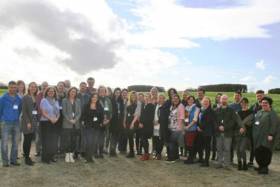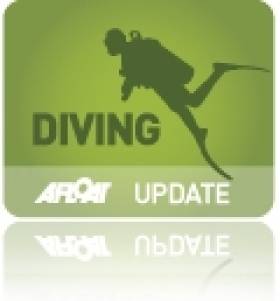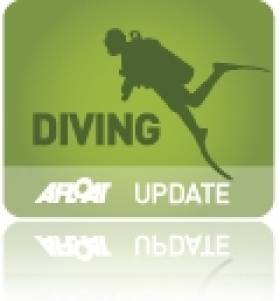Displaying items by tag: Ken O'Sullivan
Ken O'Sullivan's "Into The Deep" Tour Dates Confirmed
Marine wildlife documentary Ken O’Sullivan, who first filmed basking sharks “speed dating” off the west coast, has confirmed dates for his nationwide “Into the Deep” tour.
As The Sunday Independent reports, O’Sullivan’s material is now being used on two Junior Cert courses after he gave footage free of charge to the Department of Education.
The two Junior Cert subjects of geography and business studies are benefiting from the material from his two-part documentary, Ireland’s Deep Atlantic.
How sound travels five times faster in the ocean, the richness of marine life on the Continental Shelf and the work of Irish research scientists on the State’s marine research vessel, Celtic Explorer, are among the clips.
 A stunning jellyfish image captured off the Irish coast by film maker Ken O'Sullivan
A stunning jellyfish image captured off the Irish coast by film maker Ken O'Sullivan
The documentary donation was accepted by the Department of Education as it meets the 17 UN Sustainable Goals which were adopted by UN member states, including Ireland, in 2015.
O'Sullivan has just announced 2024 Irish dates for his live show, entitled “Into the Deep”, which captures his adventures exploring the north Atlantic. The first part of his tour sold out in many venues.
Audiences will hear of his unforgettable dive in 2016 when he was the first cameraman in the world to film and document a group of 35 thirty basking sharks engaged in a courtship ritual off the Clare coast.
The live show is a mix of film and stories from his 18-year long career, during which he also pays tribute to his family’s 250-year history on Fenit Island, Co. Kerry.
O’Sullivan has made 17 documentaries, including North Atlantic – The Dark Ocean which was broadcast on RTE this summer, and published a book, “Stories from the Deep”, in 2019.
His work has been screened in 25 countries, and his awards include the Grand Prix at the Wildlife Film Festival Rotterdam, beating BBC’s “Arctic: Our Frozen Planet”. He also worked as a cameraman for the BBC Natural History Unit.
His “Into the Deep” tour dates are
- Westport Town Hall, Co. Mayo – Wed Jan 31st
- Lime Tree Theatre Limerick – Sat Feb 3rd
- Mermaid Wicklow - Wed Feb 7th
- Theatre Royal Waterford – Thurs Feb 8th
- Axis Ballymun – Thurs Feb 22nd
- Birr Theatre & Arts Centre – Fri Feb 23rd
- Watergate Kilkenny – Sat March 9th
- An Gríanán, Letterkenny – Wed March 27th
Read The Sunday Independent here
More information is here
Irish Marine Wildlife Documentary Wins Top Film Festival Prize
Maritime TV documentary North Atlantic: The Dark Ocean has been awarded the Grand Prix Best Film of Festival Award at the Wildlife Film Festival Rotterdam, besting the likes of BBC’s Our Frozen Planet.
As previously reported on Afloat.ie, the natural history series supported by the Marine Institute follows Irish underwater cameraman Ken O’Sullivan as he searches the North Atlantic waters around Ireland for some of the largest marine wildlife ever to have lived, including fin and sei whales, killer whales and courtship aggregations of massive basking sharks.
The series was broadcast in May of this year to what RTE describes as “an incredibly positive public response”.
In presenting the award to Ken O’Sullivan, the judging panel said: “Myths about sea monsters have long shaped our exploitation and maltreatment of marine life. The film that wins the Flamingo Grand Prix 2023 debunks those myths with solid knowledge and, by showing the grandeur and beauty of ocean life, it makes you realise this should be loved and protected.
“The film is an epic voyage of discovery. Free diving along with the filmmaker himself, you actually come face-to-face with a multitude of sea creatures, ranging from sprat, herring, basking sharks to killer whales, common dolphins and fin whales. All lovingly portrayed in with great craftsmanship and years of experience.
“This engaging filmmaker grabs you and takes you down into the dark waters surrounding Ireland. We — the jury — all held our breath until the end.”
New TV Series ’North Atlantic - The Dark Ocean’ Reveals Never-Before Filmed Behaviours of Iconic Marine Wildlife
North Atlantic – The Dark Ocean is a new TV series from Irish underwater cameraman Ken O’Sullivan that begins this Sunday 14 May at 6.30pm on RTÉ One and RTÉ Player.
Supported by the Marine Institute, this new natural history series follows O’Sullivan as he voyages off Ireland’s coast and out into the open North Atlantic in search of large whales, deep-water sharks and other iconic marine wildlife that inhabit our dark ocean — and reveals never-before-seen behaviours and challenges of some of our greatest wild animals.
Inspired by the spirit of adventure of early explorers such as St Brendan the Navigator, O’Sullivan journeys out into the open North Atlantic in search of the great sea monsters described in their early texts.
After more than 10 years, he finally swims with a fin whale and captures incredible footage that documents its individual patterns.
Using an unmanned submarine aboard the RV Celtic Explorer, O’Sullivan journeys to the deepest parts of Ireland’s Atlantic waters where he discovers thousands of cat sharks in a deep-water nursery. He also addresses the decimation of sharks in Ireland and across the globe.
North Atlantic - The Dark Ocean also deals with the concerning issue of the treatment of our oceans and its creatures. The series explores concerns such as toxicity in whales from human activity in the ocean and the decimation of fin whales due to whaling. The series emphasises how society must work harder to conserve these precious ecosystems.
In episode one, broadcast this Sunday 14 May, O’Sullivan explores the dark ocean waters to the north of Ireland. Here he encounters monstrous winter storms and discovers that these are a huge source of fertility in the ocean. He meets a group of minke whales lunge-feeding on shoals of sprat, and travels to Arctic Norway in search of massive herring shoals that once abounded in Ireland.
In episode two (Sunday 21 May), O’Sullivan travels the south coast of Ireland searching for fin whales. These hugely enigmatic creatures are the second largest animals to have ever lived, but almost nothing has been documented about their migration routes, especially for breeding, until now.
O’Sullivan voyages 1,500km out to the Mid-Atlantic ridge in search of more fin whales. Here he finds sea mounts, oases of life in the open ocean, and gains a deeper understanding of the ocean’s eco-system.
In the series finale (Sunday 28 May), O’Sullivan embraces the spirit of early explorers and gains an understanding of some of the ocean’s greatest and most diverse animals, from the surface waters to the deepest parts of the North Atlantic. He documents more than 30 basking sharks engaged in a courtship ritual – possibly the largest ever group of their kind captured on camera.
The series also features an original classical music soundtrack by young composer Bradley Ayres, performed by the RTÉ Concert Orchestra.
Speaking about the series, Ken O’Sullivan said: “Almost three years in production, North Atlantic – The Dark Ocean is a hugely ambitious natural history TV series featuring the iconic creatures and fascinating marine life of Ireland’s North Atlantic ocean.
“It would not have been possible without the support of many. We are particularly grateful to the Marine Institute for providing us with ship time and access to the RV Celtic Explorer and their remotely operated vehicle, the ROV Holland I, which enabled us to voyage further, explore deeper and share amazing discoveries in Ireland’s deep ocean.”
North Atlantic - The Dark Ocean starts this Sunday 14 May at 6.30pm on RTÉ One and RTÉ Player.
Irish Ocean Literacy Network Meeting Shapes The Conversation About Our Oceans & Human Health
The Irish Ocean Literacy Network held its sixth national meeting last Wednesday 20 February at the Marine Institute in Galway, where keynote speakers Dr Easkey Britton — surfer and post doc fellow at NUI Galway — and filmmaker Ken O’Sullivan of Sea Fever Productions spoke about the importance the ocean has on our lives as islanders.
Speaking at the event as chair, Cushla Dromgool-Regan of the Marine Institute welcomed having two distinguished guest speakers, highlighting the importance of recognising Ireland’s rich maritime heritage and being able to share our stories.
“As an island nation we are extremely lucky to have a wealth of experts from all walks of life willing to share their experiences with the wider marine community,” she said.
“From being able to see a whale and its calf close up in Irish waters through Ken’s film work, to watching children learning to surf for the first time with Easkey, reminds us of the diversity and importance of our maritime heritage and looking after our ocean for future generations.”
Easkey Briton is widely recognised for her international achievements in surfing is currently completing a post-doctoral research fellow with the EU-Horizon 2020 project Seas, Oceans and Public Health in Europe (SOPHIE).
Growing up in a family of surfers, Easkey talked about how her life passion for the water has brought her in a full cycle, where much of her research as a social scientist has been about the environment and society.
“Bringing people together through community outreach to working with a range of stakeholders in my current research highlights how we all value the ocean in different ways, yet together we all seem to understand the importance of linking our ocean with human health,” Easkey said.
Filmmaker Ken O’Sullivan also spoke at the event sharing his love of the ocean. Coming from a family of fishermen and then learning to dive opened up a new world of discovery for Ken at a young age, where he stated “exploring the ocean as a child with no limitations was like living the life to what might be similar to Huckleberry Finn. Now making a career out of filming wildlife and creative documentaries in the most extreme environments has been a life of adventures.”
Ken O’Sullivan set up Sea Fever Productions in 2006 with Katrina Costello to produce wildlife and creative documentaries. In 2018 they produced Ireland’s Deep Atlantic, a hugely ambitious ocean natural history series searching for blue whales and cold water coral reefs in the deep waters of the North Atlantic, documenting habitats and whale and shark behaviour for the first time ever.
“I have worked with a range of people who have contact with the ocean from fishermen, whale watchers to marine researchers and scientists during their deep sea expeditions, [and] coupled with the development of filming technology, [it] has provided an incredible opportunity to capture footage of marine life right at our doorstep,” Ken said.
“The feedback from the public who have seen my work has been extremely rewarding, particularly from those who are seeing marine life in Irish waters for the first time.”
With a wide range of ocean champions promoting ocean engagement across the island of Ireland, the Irish Ocean Literacy Network says it has seen a significant growth in the last six months, with nearly 100 members representing individuals, small businesses, outreach and education specialists, researchers, NGOs, State agencies and Government departments throughout Ireland.
Garry Kendellen, secretariat of the network, said: “With the recent growth of the IOLN membership, it is encouraging see a sense of the ocean community in one room.
“Our network is a truly eclectic mix of people, who share a similar passion for the ocean. From community outreach to larger national collaborations, it is great to see so many members willing to share their experiences with the network, providing advice and inspiring new collaborations and ideas.”
During the strategic workshop run by David Murphy of AquaTT, he noted: “As an island nation we are in a unique position to help contribute to the national and international efforts to increase peoples understanding and engagement about the ocean.
“We are all individuals who bring something new to the network, yet working together as a collective highlights the importance of creating impactful actions and messaging promoting our ocean from coast to coast.”
The Irish Ocean Literacy Network holds four membership meetings per year where attendees are able to meet other ocean champions who are keen to raise awareness and engagement about the ocean in Ireland. Membership is currently free and if you are interested in learning more, contact [email protected].
The Marine Institute are funders of the Irish Ocean Literacy Network secretariat, which was awarded to Galway Atlantaquaria from 2018-2020. This aims to supports the institute’s Strategic Plan 2018-2022, Building Ocean Knowledge – Delivering Ocean Services, as well as the Government’s marine strategy Harnessing Our Ocean Wealth, whereby it aims to increase awareness of the value, opportunities and societal benefits of our ocean, as well as raising peoples engagement with the ocean.
New Irish Language TV Series Unlocks Secrets of Ireland's Marine Environment
Ireland’s unexplored 220-million-acre marine environment will be revealed in a landmark new TV series which began last week.
As previously reported on Afloat.ie, Farraigí na hÉireann (Seas of Ireland) is a new six-part Irish-language series on Ireland's marine wildlife, which aired its first episode on TG4 last Tuesday 20 September.
Irish Film and Television News interviewed series co-creator Ken O'Sullivan about the unique series, which is the first of its kind in Ireland in unlocking the secrets of the abundant wildlife in the seas around our coast.
“We tried to combine coastal heritage with wildlife,” said O'Sullivan on the intentions behind the series. “We want to show how ancient coastal communities connected with wildlife.
"As filmmakers, our approach is that we try not to use science as the beginning and end of the story. We like to look at people’s connection with these natural worlds.”
As such, the series does not have a presenter, but its story is told through its contributors.
“We have passionate marine biologists and we have small fishermen, from places like the Aran Islands and Kerry, reflecting about their time at sea and how they relate to the sea, to try and convey the story.
"Hopefully, all these contributors bring a narrative to the unique underwater photography.”
And it's this underwater imagery that's surely the star of the show. As much as 70% of the series was filmed under the surface over the course of a year in locations around the country, using cameras in a special water-tight housing.
Deep water footage was also captured by high-definition cameras on an unmanned submarine, giving us the best ever view of life in the depths.
Farraigí na hÉireann can be seen Tuesdays at 8pm on TG4, with repeats on Sundays at 9pm.
Dive Ireland takes place this Weekend
CFT who are the national governing body for sports diving in Ireland will hold it's AGM and National Dive Conference at this event.
Some of the speakers include the following:
Jack Ingle Kit configuration
Barry McGill Deep wreck diving off the Donegal Coast
Nigel Motyer Underwater photographer
Tim Carey & Eoin Mc Garry Dive expedition to Asgard II in 2010
Ken O'Sullivan Irish ocean wildlife series Showing January 23rd TG4
Shane McArdle Sports Partnership and what it could mean for CFT clubs
More details and timetable HERE
Details Announced for Dive Ireland 2011
Dive Ireland, Ireland's only dedicated dive show is taking place on the 5th & 6th March. The venue
is the City North Hotel just off the M1 Northbound. Just 15 minutes from Dublin airport and 25 minutes from Dublin city.
CFT who are the national governing body for sports diving in Ireland will hold it's AGM and National Dive Conference at this event.
Some of the speakers include the following:
Jack Ingle Kit configuration
Barry McGill Deep wreck diving off the Donegal Coast
Nigel Motyer Underwater photographer
Tim Carey & Eoin Mc Garry Talk on the dive expedition to Asgard II in 2010
Ken O'Sullivan Irish ocean wildlife series Showing January 23rd TG4
Shane McArdle Sports Partnership and what it could mean for CFT clubs
































































